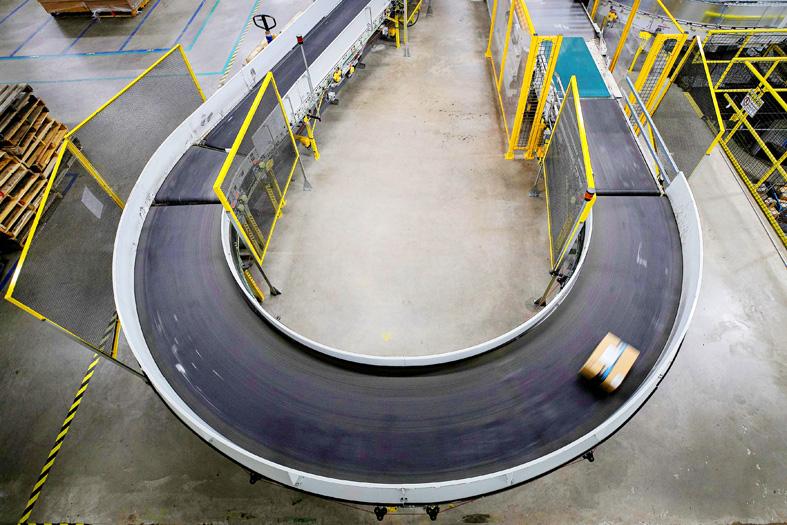The French Ministry of Finance on Wednesday said it has sent out notices to big tech companies liable for its digital service tax to pay the levy as planned next month.
Paris suspended collection of the tax, which affects companies like Facebook Inc and Amazon.com Inc, early this year while negotiations were under way at the Organisation for Economic Co-operation and Development (OECD) on an overhaul of international tax rules.
The ministry has long said it would collect the tax next month as planned if the talks proved unfruitful by then, which is what happened when the nearly 140 countries involved agreed last month to keep negotiating until the middle of next year.

Photo: Reuters
“Companies subject to the tax have received their notice to pay the 2020 instalment,” a ministry official said.
France last year applied a 3 percent levy on revenue from digital services earned in France by companies with revenues of more than 25 million euros (US$29.8 million) there and 750 million euros worldwide.
Facebook’s stance “is to ensure compliance with all tax laws in the jurisdictions where we operate,” it said, adding that it had received its tax bill from the French authorities.
Amazon has received a reminder from the French authorities to pay the tax and would comply, a person familiar with the matter at the online retailer said.
Paris has said it would withdraw the tax as soon as an OECD deal is reached to update the rules on cross-border taxation for the age of online commerce, where big Internet companies can book profits in low-tax countries regardless of where their customers are.
The talks stalled as US President Donald Trump’s administration became reluctant to sign on to a multilateral agreement, officials have said.
“We will levy this digital taxation mid-December as we always explained to the US administration,” French Minister of Finance Bruno Le Maire told a Bloomberg event on Monday. “Our goal remains to have an OECD agreement by the first months of 2021.”
Dan Neidle, a partner at law firm Clifford Chance, was skeptical US president-elect Joe Biden would agree to such a deal.
“I’m not sure why Biden would agree to something which enables US corporations to pay more tax in Europe and has not many benefits to the US,” Neidle said.

‘SWASTICAR’: Tesla CEO Elon Musk’s close association with Donald Trump has prompted opponents to brand him a ‘Nazi’ and resulted in a dramatic drop in sales Demonstrators descended on Tesla Inc dealerships across the US, and in Europe and Canada on Saturday to protest company chief Elon Musk, who has amassed extraordinary power as a top adviser to US President Donald Trump. Waving signs with messages such as “Musk is stealing our money” and “Reclaim our country,” the protests largely took place peacefully following fiery episodes of vandalism on Tesla vehicles, dealerships and other facilities in recent weeks that US officials have denounced as terrorism. Hundreds rallied on Saturday outside the Tesla dealership in Manhattan. Some blasted Musk, the world’s richest man, while others demanded the shuttering of his

TIGHT-LIPPED: UMC said it had no merger plans at the moment, after Nikkei Asia reported that the firm and GlobalFoundries were considering restarting merger talks United Microelectronics Corp (UMC, 聯電), the world’s No. 4 contract chipmaker, yesterday launched a new US$5 billion 12-inch chip factory in Singapore as part of its latest effort to diversify its manufacturing footprint amid growing geopolitical risks. The new factory, adjacent to UMC’s existing Singapore fab in the Pasir Res Wafer Fab Park, is scheduled to enter volume production next year, utilizing mature 22-nanometer and 28-nanometer process technologies, UMC said in a statement. The company plans to invest US$5 billion during the first phase of the new fab, which would have an installed capacity of 30,000 12-inch wafers per month, it said. The

MULTIFACETED: A task force has analyzed possible scenarios and created responses to assist domestic industries in dealing with US tariffs, the economics minister said The Executive Yuan is tomorrow to announce countermeasures to US President Donald Trump’s planned reciprocal tariffs, although the details of the plan would not be made public until Monday next week, Minister of Economic Affairs J.W. Kuo (郭智輝) said yesterday. The Cabinet established an economic and trade task force in November last year to deal with US trade and tariff related issues, Kuo told reporters outside the legislature in Taipei. The task force has been analyzing and evaluating all kinds of scenarios to identify suitable responses and determine how best to assist domestic industries in managing the effects of Trump’s tariffs, he

Taiwan’s official purchasing managers’ index (PMI) last month rose 0.2 percentage points to 54.2, in a second consecutive month of expansion, thanks to front-loading demand intended to avoid potential US tariff hikes, the Chung-Hua Institution for Economic Research (CIER, 中華經濟研究院) said yesterday. While short-term demand appeared robust, uncertainties rose due to US President Donald Trump’s unpredictable trade policy, CIER president Lien Hsien-ming (連賢明) told a news conference in Taipei. Taiwan’s economy this year would be characterized by high-level fluctuations and the volatility would be wilder than most expect, Lien said Demand for electronics, particularly semiconductors, continues to benefit from US technology giants’ effort